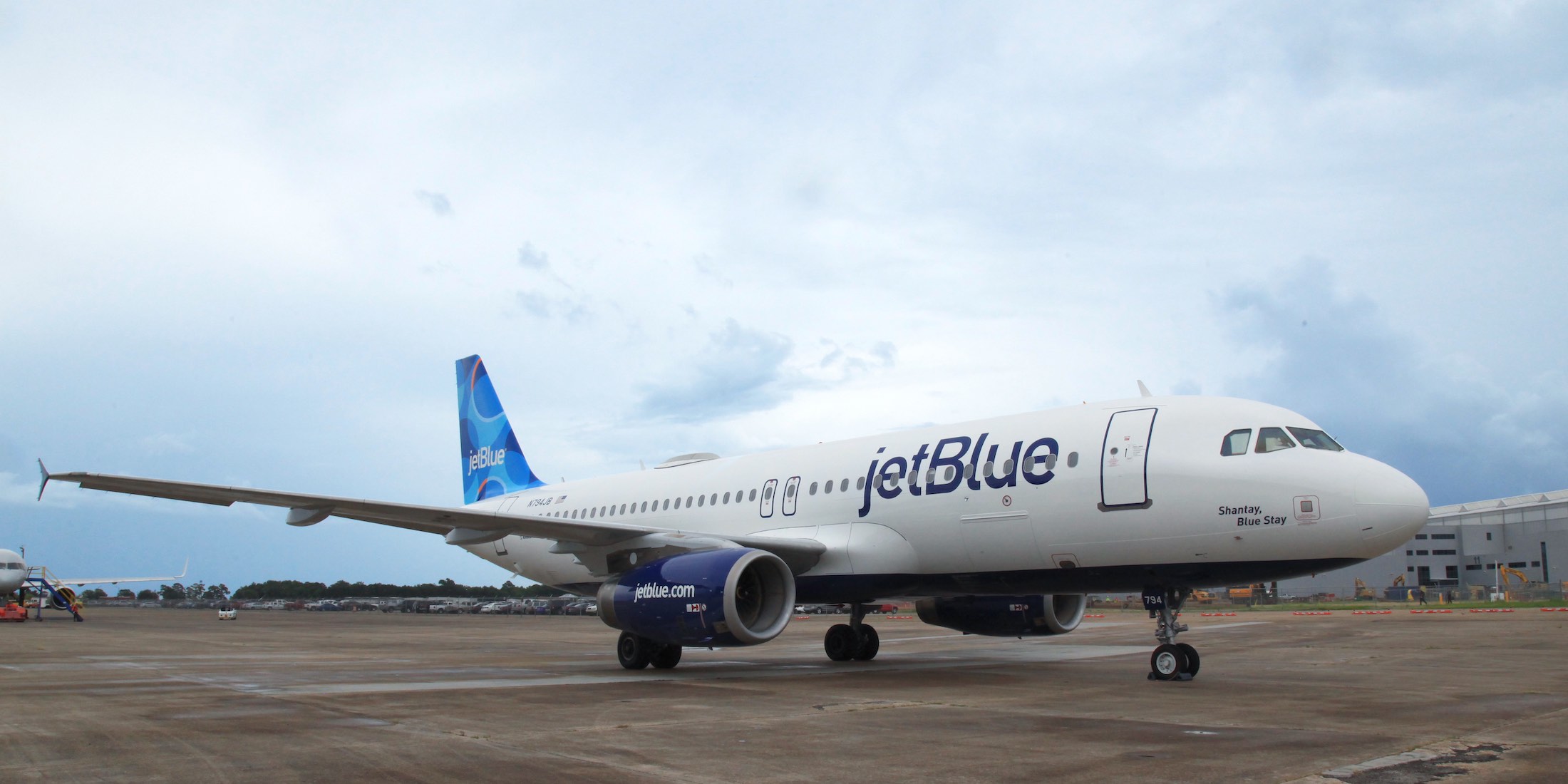
A JetBlue pilot was arrested and remanded to JetBlue after registering his blood-alcohol level at four times the legal limit for commercial airline pilots.
JetBlue Pilots Faces Job Termination, Intoxication Charges
The first officer, 52-year-old James Clifton, was set operate JetBlue 2465 from Buffalo (BUF) to Fort Lauderdale (FLL) on Wednesday but was flagged for further screening by a Transportation Security Administration (TSA) officer, who observed that the co-pilot appeared drunk.
Niagara Frontier Transportation Authority police administered the test, which registered at a staggering 0.17, more than four times the legal limit for commercial airline pilots in the USA. The Federal Aviation Administration (FAA) requires blood-alcohol level or breath-alcohol concentration to be no more than 0.04 (about half the legal limit for driving an automobile in most states). It also prohibits pilots from consuming alcohol within eight hours of reporting for duty.
Clifton now faces federal charges and the termination of his job from JetBlue. Per CNN, he admitted to police that he had consumed 5-6 drinks the night before.
The story was first reported by The Buffalo News. A JetBlue spokesperson noted:
“The safety of JetBlue’s customers and crewmembers is our first priority. We adhere to all DOT rules and requirements concerning alcohol at all times and have a very strict zero tolerance internal alcohol policy. We are aware of the incident that occurred this morning in Buffalo and are cooperating fully with law enforcement. We are also conducting our own internal investigation. The crewmember involved has been removed from his duties.”
Meanwhile, the FAA “is investigating allegations that an airline pilot attempted to report for duty while under the influence of alcohol. The agency takes these matters seriously.”
The flight to Fort Lauderdale ended up being delayed by more than four hours until a replacement pilot could be found.
CONCLUSION
No jokes here. It’s true that having a blood-alcohol level of 0.17 does not necessarily mean that Clifton was sufficiently impaired to put passengers at risk. But that’s not the standard: pilots are held to a higher standard for very good reason–like many professions, they are only as strong as their weakest link. Strict alcohol limits are in place to prevent a pilot from even closely approaching the limit in which a “normal” person might become intoxicated. Whether Clifton has an alcohol dependency issue or just enjoyed a few too many the night before is really immaterial: assuming the reading was correct, his dereliction of duty is a sobering warning to other pilots that alcohol and flying simply do not mix.
image: JetBlue




Just say “no” to puns.
😉
I don’t believe that 0.17 BAC is simply a “standard” without a direct correlation to impairment. There is a well documented correlation between impairment and BAC. I wouldn’t get in a car with a driver having a BAC of 0.17, much less an airplane with a pilot at 0.17.
No one should be operating a vehicle, aircraft, or watercraft at 0.17 BAC. This isn’t holding pilots to a “higher standard.” If anything the BAC should be much lower than 0.04. Minors who operate cars often have a much lower BAC standard and do do drivers of automobiles in other countries.
You comments about standards implies that he may have been fine to operate an aircraft with passengers – the truth is that he was legally impaired by any standard.
What A said!
What does commuting alcohol mean?
“It’s true that having a blood-alcohol level of 0.17 does not necessarily mean that Clifton was sufficiently impaired to put passengers at risk.”
Nope, sorry, that’s a level where mistakes are made and lives are indeed put in danger. The very fact a TSA agent noticed it is enough. It’s tragic and he clearly has a significant problem now that’s even more compounded. I am not sure what airlines do to reach out to those with dependency problems with pilots but I imagine they need to more. Now his life is essentially ruined on top of battling what is clearly a problem with alcohol. Sadly, this just makes his recovery all that much harder.
.17 is a LOT. That’s about 6 drinks in 60 minutes to get an average adult up to that level. What do you mean by he may not have been impaired ?
Just because he had a high residual BAC doesn’t mean he was hammered and would have staggered onboard impaired.
That said, the rules are clear, he violated them, and now should lose his job and face federal charges. Be very clear: I’m not excusing him in any way, simply pointing out that some drunks are highly functional.
When I was on active duty (same time as when I earned my Private Pilot License) ~ 35 years ago, the clinic I worked in had a breathalyzer (for competence for duty exams). Out of curiosity, a few times on a Friday early evening I (in uniform) stopped by the clinic on my way home from a couple of beers at the O-Club just to check my BAC (blood alcohol content). The occasions when I did NOT feel any impairment my BAC was 0.06 or lower, the occasions when I could feel impaired (but still okay to drive) my BAC was 0.07 to 0.08, I never had (or drove with) a BAC over 0.08. The “legal” limit in Virginia at the time was 0.10. I believe that I could not have achieved a level higher than 0.15-0.20, I believe I would have vomited, fallen asleep and/or passed out prior to that level. Once, when my level was 0.80, I took the advice of a respected and respectful young Corpsman: “Doc or Sir (can’t recall the exact wording), why don’t you take a nap for an hour or 2 before you drive (15-20 minutes) home?” That “nap” lasted almost 2 hours.
I was a (light) “social” drinker at the time (4-6 drinks per week), drink even less these days particularly considering recent research which upon correcting for other recent medical advances has concluded that the healthiest amount of alcohol to consume is ZERO, in contrast to the past 30-40 years when medical science concluded that moderate alcohol consumption (1-2 drinks per day) was most healthy.
I’ve only had more than 6 drinks once in my life, age 21 (~ 45 years ago) celebrating receipt of my first medical school acceptance letter. I purposely went out with some friends (college classmates) with the intention of a shot of Tequila for each previously received rejection letter. After the 7th or 8th shot I was barfing my brains out while sitting on the curb in front of the bar, which happened to be right next to the firehouse. Fortunately and thank goodness for good friends who convinced the police officer that I was “okay” (and just celebrating that “I’m gonna be a doctor”) and drove me back to the dormitory (in my car using the keys I had given them prior to entering the bar) and even cleaned the car after I (thought I had) barfed again “out the window”.
My point is that 0.17 is highly significant, twice the level at which I felt some impairment, a level most people cannot achieve. To be “functioning” with that high an alcohol level implies a significant tolerance of alcohol based on long term heavy usage. I agree completely with “I wouldn’t get in a car with a driver having a BAC of 0.17, much less an airplane with a pilot at 0.17.” I wouldn’t go near my (Cessna) airplane with ANY alcohol during the preceding 12 hours, much less “5-6 drinks the night before”. Since I believe in second (but not third) chances, a pilot with a BAC of 0.170, particularly a Commercial Pilot or Airline Transport Pilot, should be prosecuted, have his license suspended for 6-12 months and successfully complete mandatory alcohol rehabilitation, second offense should be pilot license revocation.
As I was taught during my Alcohol Rehab for Healthcare Professionals training 37 years ago, 1 alcohol related problem (DUI, DWI, late for work due to being hungover, fight due to being drunk, etc.) implies a 50% likelihood of alcohol dependence (alcoholic), 2 such problems 90% likelihood (non-alcoholics learn from the first time and don’t repeat), 3 such problems 99% likelihood (or the dumbest human being on earth). We were also taught that at any given time, even at 8:00am on a Monday morning, 10% of drivers on the road are alcohol impaired. If drug use is included, that percentage is undoubtedly even higher.
The prevalence of alcohol dependence, and thus alcohol related problems, was confirmed in the early days of COVID when Liquor Stores were designated “essential businesses”, mainly so millions of Americans wouldn’t go into alcohol withdrawal all at the same time. (What a sad commentary about the USA.)
REFERENCES: The Lancet, Volume 392, Issue 10152, P1015-1035, September 22, 2018:
Alcohol use and burden for 195 countries and territories, 1990–2016: a systematic analysis for the Global Burden of Disease Study 2016: Interpretation: Alcohol use is a leading risk factor for global disease burden and causes substantial health loss. We found that the risk of all-cause mortality, and of cancers specifically, rises with increasing levels of consumption, and the level of consumption that minimises health loss is zero. These results suggest that alcohol control policies might need to be revised worldwide, refocusing on efforts to lower overall population-level consumption.
November 2nd 2021 PLOS Medicine by Ulrich John of University Medicine Greifswald, Germany, and colleagues: “The results support the view that people in the general population who currently are abstinent from alcohol do not necessarily have a shorter survival time than the population with low to moderate alcohol consumption,” the authors say. “The findings speak against recommendations to drink alcohol for health reasons.”
April 23, 2020: “But chief among considerations for many governors and healthcare officers in each state are the dangers associated with detoxing from regular alcohol use without medical supervision. What’s more, there is strong evidence that alcohol-related domestic violence can worsen if access to alcohol is denied or limited. In short, liquor stores are often considered essential businesses because they prevent additional healthcare emergencies.”
Apr 20, 2020: “Liquor stores were deemed essential businesses in almost every state in the US as other stores were forced to shut down. They were deemed essential partly because of how dangerous it could be for alcohol-dependent people to undergo withdrawal, especially at a time when hospitals are stretched thin due to COVID-19.”
“What do you call the person who graduates LAST in his or her medical school class?” Answer: “Doctor.”
(Sorry Matthew for the soapboxing, obviously a subject close to my heart.)